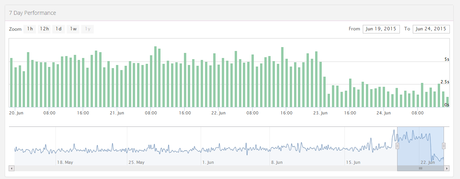The speed of your website is sometimes correlated with your search rankings, Google has even said it’s a factor in their search algorithm (as far back as 2011) – but did you know it can also have an effect on the income and lead generation of your website?
We’ve spoken about the physical performances reasons to decrease your page load time by using a CDN in a previous post including; caching, security, distribution of data and much more besides.
SEOAndy as a company works with South West Broadband for hosting, recently we upgraded our service primarily to increase speed, security and future proof the sites we are hosting. The upgrades are part of a package of things we are doing for sites such as SEOAndy, Mick Cookson Photography and others – in essence it is about speed and security. These are sites that now all use a CDN for file hosting (they aren’t small sites) and sit behind a separate firewall allowing for brilliant security (we use CloudProxy). The upgrades combined with deep use of free wordpress performance plugin W3 Total Cache makes for amazing things.
And the proof is in the pudding, this is a screenshot of website load times taken from a site recently upgraded – the speed increase is between 60 and 80% consistently.

Does Page Load Time Really Effect Your Bottom Line?
In short, YES!
But lets look at the evidence. The seed for speed was growing in 2009 when an Akamai study showed that 47% of people expected to have a website load within 2 seconds or less – and that 40% of users will “bounce” (go back) from a page if its not loaded within 3 seconds.
In 2010, The Gomez Report found that 75% of users would leave one shopping site for another because of slow loading times and bad user experience. 88% also indicated that they would not return to a website where they had had such an experience.
In 2013, Radware did some research and found that in the UK 67% of web users said that website slowness was a key factor in abandoning a purchase, in the US this was 51% – high figures which clearly indicate the “need for speed” was a thirst that was growing.
Move forward to 2015, we live in a world which is mobile – constant advertising by mobile and broadband firms of “superfast” connections and it’s easy to see that these numbers have likely increased and website load times are today a vital part of any digital strategy. If your website is slow, you could be leaving customers unhappy and money on the table.
Every Engagement Optimised, For Speed!
In previous seo articles I’ve wrote about AB testing and landing page optimisation techniques, these are literally testing user preference and optimising based on interactions. The email pop-up you see on this, and other sites, is testing for responses (in our case once a % of conversions is met it becomes the full time lead form until a new test starts). But physical user testing isn’t just about what happens once something loads and how it looks, its about speed – speed can be a key influence of use, as outlined in the studies above.
There is no point in making your site look amazing and call to actions amazing, if your site is going to crawl along.
Your target should always be speed, super speed – beating not just your industry competitors but the big names in town. Shaving off just a few milliseconds can seriously impact on user confidence and increase your conversion rates, reduce abandonment’s and increase search rankings.
4 Common Slow Loading Website Elements
- Bloated Website Code
As a website grows you may add plugins and elements to make it “all singing, all dancing” but you are also likely to be slowing the website down to some degree. Most websites start small and grow large within months – keep an eye on plugins you use and remove those which are no longer needed. - Ad Networks
If you own a blog or website that uses an adnetwork such as Google Adsense then you will have added some extra javascript to your site – this can be really slow to load at times, in particular if you’ve got more than one instance of advertising on a page (more than one ad space). Reduce the number of ads for a better user experience. - Non-Image Optimisation
Loading full size images to many CMS’s can cause issues, older versions of wordpress used to take any image size and squish it to the right size but it would still load the full image, modern wordpress creates multiple optimised sizes which reduced file size and page load time. Always try to reduce the file size of your images before upload, and if you can’t do so you should ensure you are using a modern (up to date) CMS such as wordpress 4.2 upwards. - Multiple Analytics Codes
If you are keen to optimise your website you may have 3 or 4 analytics codes loading, from Google Analytics to WordPress Jetpack to Kiss Metrics and many others. Ultimately, like the Ad Networks the external load of code takes time, the more analytics you have the slower your site will be. If you are on WordPress our advice is to use Google Analytics or Jetpack not both services, and the same goes for other CMS’s.
5 Ways to Reduce Your Website Load Time
- Use a Content Delivery Network (CDN)
Using a CDN is a cost-effective way to boost the performance of your website, in essence the CDN hosts your images and javascript files in multiple locations which are heavily cached – the nearest version of a file to a user is loaded not the original, this reduces latency in loading and ensures your server isn’t heavily hit if you’ve a boost in traffic. SEOAndy uses MaxCDN which starts at around £6 a month. - Cache Your Website
Whether you are using wordpress, magento, umbraco or another Content System there will be an effective caching plugin. These plugins (even without a CDN) should increase the speed of your website, though you may find there is eventually a trade off as a cache is in essence a temporary file that is created on your server – if your plugin isn’t optimised this can mean bursts of traffic cause a server to crash. - Improve Your Web Hosting
Other than a change of server nothing else has changed in terms of Mick’s website (graph above) which has drastically improved in page load time since upgrading servers. This alone is an illustration of how getting the right hosting for your site can seriously improve your page speed. SEOAndy now has split hosting, supplied by SW Broadband, this means smaller (and lower priority sites) are hosted separately from high maintenance and high capacity sites (such as SEOAndy) – this means we can specify exactly the needs of the websites and through a managed service the web server can be tuned to these requirements. In essence it means performance across all sites should now improve as larger sites are not using the resources of the smaller sites and the larger sites now have room to grow and of course have a highly tuned server. - Remove Plugins You Don’t Need
During a recent upgrade to the theme of SEOAndy I removed 22 wordpress plugins, one of which I hand’t used since 2012! I am guilty of hoarding plugins at times “just in case” they are needed again… But everyone needs an amnesty of plugins across websites (and extra javascript such as ad networks) – removing the plugins will seriously increase your loading speed, this is even the case with deactivated plugins. - Regularly Monitor Your Website Load Speed
Through tools such as Google Page Speed Insights and Pingdom Page Speed Testing you can keep an eye on your website performance, track your score in a spreadsheet and watch out for any problems. Both tools will be able to help highlight problem areas, GPS looks at direct advice for your site and server, Pingdom will tell you of any slow loading files. Also if you use a managed host, like SW Broadband, you may be able to get regular reports on the website load time over a week or month.
Speed Up Your Site, For Your Business
Speed rules, users care more about speed than ever before, search engines care more about speed than ever before, and you should care more about speed than ever before.
Improving your page speed will seriously increase your chances of conversion, reduce abandonment rate, and (potentially) increase user loyalty. Now is the time to improve your page speed.
Original SEO Content by SEOAndy @ Can Website Load Time Effect Your Business Income?

